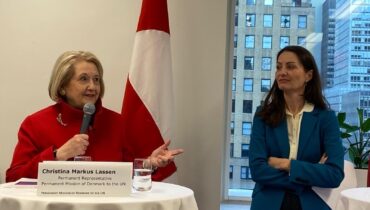Congratulations to the 15 Georgetown students who earned our graduate certificate in Gender, Peace and Security (GPS) this academic year.
This year’s graduating cohort represents 10 Master’s programs across Georgetown’s campus and includes Brionna Bolaños, Yael Bejar Bruschtein, Ellen Cayer, Sara Gangbar, Syeda Haleema Hasan, Isabelle Houghton, Mallika Iyer, Mariel Jackson, Gulzeyin “Zane” Khalibaeva, Dawn Le, Alexandra Long, Noor-E-Fayzun Nahar, Hailey Rastrelli, Luz Velazquez, and Michaela “Calee” White.
“It’s wonderful to celebrate the next generation of leaders who will advance the Women, Peace and Security agenda, and ensure we move towards a more inclusive, egalitarian world. I know this year’s graduates will have a profound impact during their careers,” said GIWPS Managing Director Carla Koppell.
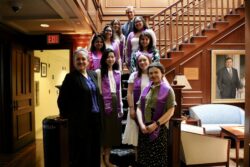
As part of this year’s graduation ceremony, GPS certificate recipients had a luncheon with GIWPS staff—including certificate director Dr. Robert Nagel—and were awarded graduate certificates and stoles in celebration of their accomplishment.
Meet Recipients of the Gender, Peace and Security Graduate Certificate
Gulzeyin Khalibaeva
Master of Eurasian, Russian and East European Studies, School of Foreign Service
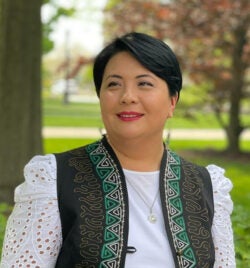 “I come from a society deeply rooted in patriarchal traditions, where women face stringent regulations at every stage of their lives. I aspire for my daughter and future generations of women, both from Central Asia and around the world, to live to their fullest potential, unimpeded by gender-related barriers.”
“I come from a society deeply rooted in patriarchal traditions, where women face stringent regulations at every stage of their lives. I aspire for my daughter and future generations of women, both from Central Asia and around the world, to live to their fullest potential, unimpeded by gender-related barriers.”
Gulzeyin said the most impactful part of the GPS certificate program was having access to and learning from professionals in relevant fields. After graduation, she plans to work on issues related to gender, migration, and peace.
Alexandra Long
Master of German and European Studies, School of Foreign Service
“The GPS certificate gave me the tools to interview successfully for the Women’s Democracy Network (WDN) internship at International Republican Institute (IRI), a reputable, non-partisan NGO focused on democracy-building. I will be returning to IRI as a Program Associate in the Europe Regional program after graduation. If it weren’t for the GPS program, I am not sure if I would have gotten the WDN internship, which eventually culminated in a full-time position after graduation. I am forever indebted to the program because it not only taught me useful skills for my career, but it also allowed me to be introspective, question my own learning and biases, and navigate my everyday life through a gender-sensitive lens.”
As a student in a regional studies program, Alexandra often focused on one region and its histories, conflicts, and perspectives. She said the GPS program broadened her perspectives in terms of regional knowledge, while also giving her unique tools to advance her studies and career.
Mallika Iyer
Master of Science in Foreign Service, School of Foreign Service
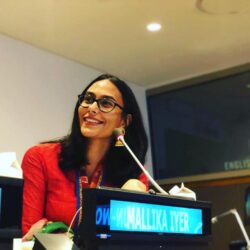 “I chose to study Gender, Peace, and Security to better understand how peacebuilding and gender equality intersect…It was really helpful to have the opportunity to learn from gender experts and re-examine the beliefs and perceptions I had developed through my past work experience.”
“I chose to study Gender, Peace, and Security to better understand how peacebuilding and gender equality intersect…It was really helpful to have the opportunity to learn from gender experts and re-examine the beliefs and perceptions I had developed through my past work experience.”
Malika served as the Co-President of the Georgetown Women in International Affairs during her time at Georgetown. She is a Presidential Management Fellowship finalist (2024) and hopes to work on gender issues within the US Government.
Syeda Haleema Hasan
Master of Public Policy, McCourt School of Public Policy
 “I come from Pakistan and grew up constantly learning about security issues. In my senior year [of college], I started supporting The Grief Directory, an NGO by a dear friend and colleague that provides support to victims of terrorism and political violence, works on peacebuilding including engaging masculinities, and promotes interfaith harmony, especially by engaging the youth. Three years later, when I arrived at Georgetown for my Master’s in Public Policy, I knew I wanted to formally pursue an education that helps link my policy degree, development sector experience, and quantitative skills to gender, peace and security.”
“I come from Pakistan and grew up constantly learning about security issues. In my senior year [of college], I started supporting The Grief Directory, an NGO by a dear friend and colleague that provides support to victims of terrorism and political violence, works on peacebuilding including engaging masculinities, and promotes interfaith harmony, especially by engaging the youth. Three years later, when I arrived at Georgetown for my Master’s in Public Policy, I knew I wanted to formally pursue an education that helps link my policy degree, development sector experience, and quantitative skills to gender, peace and security.”
For Syeda, a meaningful part of the certificate program was classroom discussions with professors and peers, which brought perspectives from all over the world and created space for both debate and critical self-reflection. During her time at Georgetown, she worked with CARE International’s Global Health, Equity and Rights Advocacy team, the IFC’s gender and SME finance team, and HMSHost’s Strategic Alliances department. After graduation, she is pursuing opportunities related to the climate crisis, gender-based violence, and women’s economic empowerment.
Hailey Rastrelli
Master of Arts in Liberal Studies, School of Continuing Studies
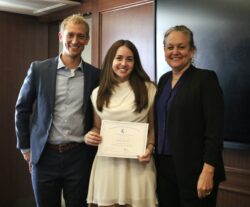 “I had the honor of working with [a woman who] fought for Bangladesh’s first written law abolishing sexual violence. This was just one victory. I have come to realize the solution [to sexual violence] might not even be in my lifetime or during my career, but those are the causes that are most worth fighting for. And the causes I am called to act for.”
“I had the honor of working with [a woman who] fought for Bangladesh’s first written law abolishing sexual violence. This was just one victory. I have come to realize the solution [to sexual violence] might not even be in my lifetime or during my career, but those are the causes that are most worth fighting for. And the causes I am called to act for.”
The GPS program and network helped Hailey shape how she saw her future. Her goal is to attend law school and work as a legal analyst for the defense and intelligence community, where she can apply her knowledge of gender, peace and security into practice.
Noor-E-Fayzun Nahar
Master of Global Human Development, School of Foreign Service
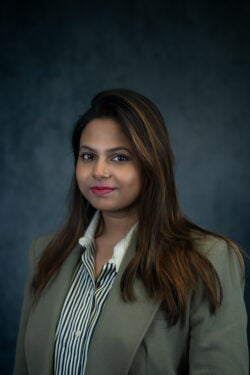 “The most impactful part of my certificate experience was gaining a deeper understanding of the complex interplay between gender dynamics, development, and peacebuilding. This knowledge allowed me to integrate gender-sensitive strategies into my work, particularly in developing policies and initiatives that empower marginalized communities.”
“The most impactful part of my certificate experience was gaining a deeper understanding of the complex interplay between gender dynamics, development, and peacebuilding. This knowledge allowed me to integrate gender-sensitive strategies into my work, particularly in developing policies and initiatives that empower marginalized communities.”
During her time at Georgetown, Noor worked with BRAC International, a leading nonprofit organization, to develop a transformational advocacy strategy designed to impact 1.2 million adolescent girls and young women across seven African countries. This work involved conducting comprehensive socio-economic and political analyses, monitoring policy developments, and creating policy briefs to inform targeted strategies for maximal regional impact. After graduation, Noor hopes to continue advancing initiatives that empower marginalized communities.

